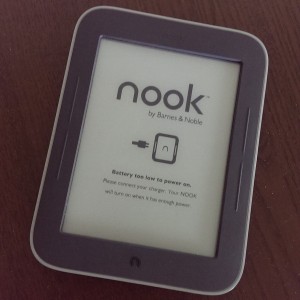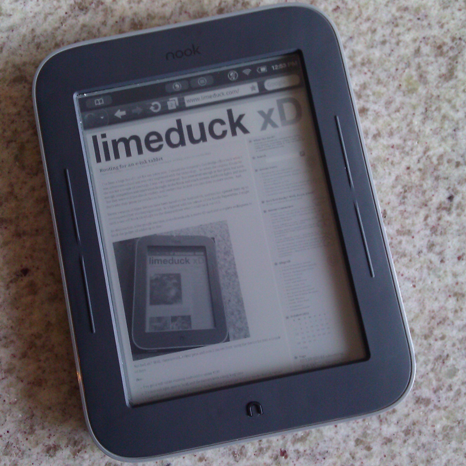Welcome to another whiny installment of, “why can’t I buy…” brought to you by the infinite diversity of humanity and the hard reality of market forces. In other words, just because I think it’s a great idea and would like to buy it, that doesn’t mean anybody else – much less a critical market mass of anybodys – wants to buy it. But I still want it, so here’s my story…
I thought it would be nice to buy an ereader as a gift, and before gifting it, load it with a handful of books so that the recipient could just turn the thing on and start reading. I thought it would be like giving a teapot and a couple of boxes of tea, or to overuse an old marketing chestnut, a razor and blades, or a bit like giving a walkman and a mix tape (but with less messy intellectual property issues, I fully intended to pay for all the gift ebooks in question, even if I already owned some). But owing to the technology of ebooks, I could deliver the whole package, as they say, turnkey.
As it turns out, what I wanted to do is nearly impossible, mainly because the ereader industrial complex wants each device registered to an individual person, and re-registering a device will wipe out any content on it. The system designed to prevent illegal sharing also subverts the first sale doctrine and makes gifting needlessly complicated.
 Here are some kludgy methods that approximate what I wanted to do, thanks in part to the earnest Nook salesperson at the Barnes and Noble in Burlington. Yes I went to a physical store to discuss gifting ebooks.
Here are some kludgy methods that approximate what I wanted to do, thanks in part to the earnest Nook salesperson at the Barnes and Noble in Burlington. Yes I went to a physical store to discuss gifting ebooks.
Buy the reader and the books separately, let the recipient put it all together. This is the easiest for the giver and somewhat less convenient for the recipient. Setting up the ereader and downloading the gifted books is hardly arduous for most, but could be tricky for a first-time ebooker. This sort of thing is fun for lego and jigsaw puzzles, but not so satisfying in this case. For some reason, I’m very attached to the idea that you could open the box and start reading right away without even fiddling with the internet connection.
Buy the reader and set it up yourself, then buy and install the books yourself. This works pretty well as long as you are willing to create a new account with [Amazon/BN/Kobo] for the purpose, and can explain to the recipient what you’ve done and critically, how to enter their own credit card info and delete yours, unless you intend to give the gift of perpetual free ebooks, of course. As a bonus, you can further customize the device before the gifting – the closest analog [sic] to inscribing the flyleaf of a paper book gift might be putting a custom wallpaper [also sic] on a gift ereader.
If you’re really close to the recipient, you might be able to set everything up using their existing email address and maybe even payment info, but this definitely eliminates any possible element of surprise. It’s more likely I’d create a new email address, then set it to forward to the recipient’s regular address once the deal is done.
Here’s why I think this is not only a good idea, but also a potentially profitable line of business for makers of ereaders and publishers of ebooks. Amazon probably doesn’t need to listen to me (though they are best positioned to actually make this happen) but maybe B&N or Kobo would be open-minded (or desperate) enough to give it a go.
Ereaders are already loss leaders for selling ebooks, and they’re getting cheaper all the time. It won’t be long before throwing in a free reader with the purchase of a few books is as common as the free razor with a package of blades. Anything to get one more user on the platform and locked in to your supply of ebooks, right? The target recipient for this gift is likely a serious reader, and should be a juicy source of recurring revenue.
 People pay for customization and convenience. For every person who’s ok with the messy methods above, I bet there’s another who would buy an ereader preloaded with NYT bestsellers, Mann Booker Prize winners, the collected works of a favorite author, or their own choice collection.
People pay for customization and convenience. For every person who’s ok with the messy methods above, I bet there’s another who would buy an ereader preloaded with NYT bestsellers, Mann Booker Prize winners, the collected works of a favorite author, or their own choice collection.
The technology already exists. Mass Customization is a thing. New cars come with the options you order. You can get a gift iPod engraved. New Kindle Fire tablets arrive configured with your account info. Most peoples’ media is already living as much in the cloud as on devices, wouldn’t it be easy to set things up to download the gift media on the first use?
Public libraries are already dong this, sort of. At many public libraries, you can check out an ereader loaded with more books than you could ever read in the lending period. For example, the Hoboken Public Library has Kindles you can borrow for two weeks, each loaded with over 100 titles, and I’m not talking about a musty collection of public domain work. Surely that proves some kind of utility for the idea of selling such readers?
Well, that’s a long way around to say, I really wanted to gift a selection of ebooks and a reader and make it easy for the recipient to read them, but it looks like the deck is stacked against me. I still think it’s a good idea, and I hope somebody figures out how to make money at it. If that somebody is you, drop me a line and I’ll send you my book list and bank wire information.

